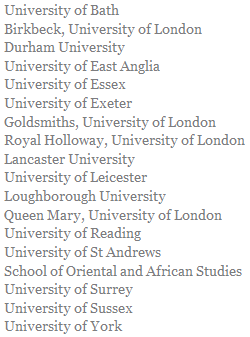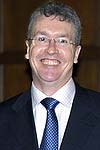|
|
|
|
|
|
|
News & Views item - February 2009 |
![]() Former
Chief of CSIRO Division of Entomology to Head Britain's 1994 Group of Small
Research-Intensive Universities. (February 25, 2009)
Former
Chief of CSIRO Division of Entomology to Head Britain's 1994 Group of Small
Research-Intensive Universities. (February 25, 2009)
| The 1994 Group |
 |
 Professor
Paul Wellings, vice-chancellor of Lancaster University, has been appointed chair
for the next three years of Britain's 1994 Group, 18 universities each of which
"undertakes diverse and high-quality research, while ensuring excellent levels
of teaching and student experience". He takes up the office on August 1.
Professor
Paul Wellings, vice-chancellor of Lancaster University, has been appointed chair
for the next three years of Britain's 1994 Group, 18 universities each of which
"undertakes diverse and high-quality research, while ensuring excellent levels
of teaching and student experience". He takes up the office on August 1.
Professor Wellings, who took degrees at the universities of London, Durham and East Anglia came to Australia having been offered a position as a research ecologist at the Commonwealth Scientific and Industrial Research Organisation (CSIRO), where he took over as chief of the Entomology Division in 1995.
From 1997 to 1999 he was head of the Innovation and Science Division, Department of Industry, Science and Resources (DSIR). He was appointed deputy chief executive of the CSIRO in 1999, before returning to the UK in 2002 to take up his appointment as Lancaster University's fifth Vice-Chancellor.
Professor Wellings' new appointment comes at a taxing time. Not only is the UK in the throes of a deepening financial recession, universities' secretary, John Denham, faces criticism for proposing to increase the differentiation between research and teaching universities in the sector, not dissimilarly to similar proposals from certain sectors of Australia's tertiary education sector.
Professor Wellings has advised the government on intellectual property in universities as part of the review of the future of higher education launched by John Denham, last year.
Currently he is chair of the Higher Education Funding Council for England's Research and Innovation Committee and also serves on the council's board, as well as being a board member of UUK [Universities UK] and chair of its International and European Policy Committee.
In short, he is well connected, and The Guardian notes Mr Denham's push of increased differentiation: "[w]ould confirm the growing divisions between groups of universities, highlighted by lobbying organisations such as the 1994 and Russell groups which act for research-intensive universities, Million+ which acts for new universities which rely mainly on teaching income, and the recently formed University Alliance which acts for institutions seeking to balance teaching and research."
In an article for The Guardian this past December Professor Wellings showed himself to be a firm advocate of the Research Assessment Exercises (RAE) when he observed: "When viewed at the national level, the policy interventions of the past decade, such as the sharp increase in research funding, the evolution of the Higher Education Innovation Fund and the continuation of the Research Assessment Exercise have helped transform the performance of UK universities. The evidence suggests the UK's position is much stronger than in the recent past and is still showing improvement." However, as TFW has observed in the past, no one has separated the effect of the different components of the mix or even attempted to do so.
Professor Wellings in speaking to The Guardian's Anthea Lipsett said: "The results of the research assessment exercise 2008 demonstrate that the 1994 group is second to none for research excellence. We are also recognised for our outstanding teaching and have a great record of delivering very high levels of satisfaction within the student experience. In these challenging economic times, our members' internationally-renowned, innovative research mean that they are ideally placed to play a full role at local, regional, national and international level. I am very much looking forward to building on Steve Smith's success in strengthening the impact of the group and setting the agenda for higher education."